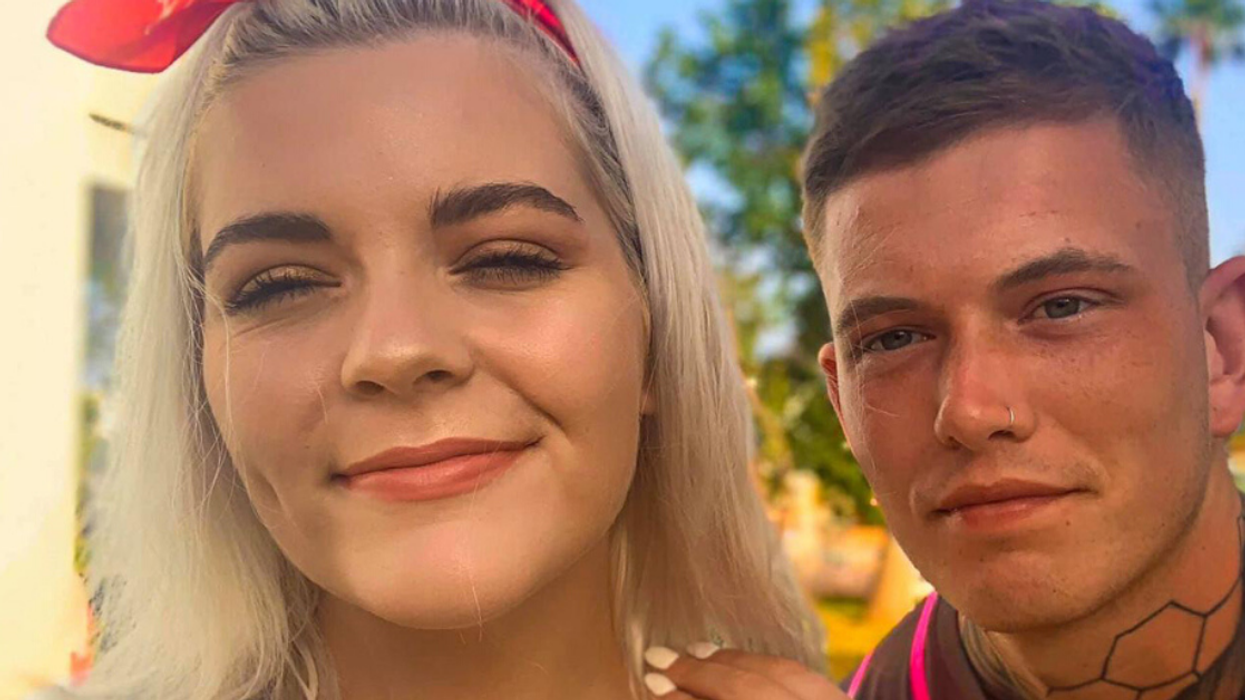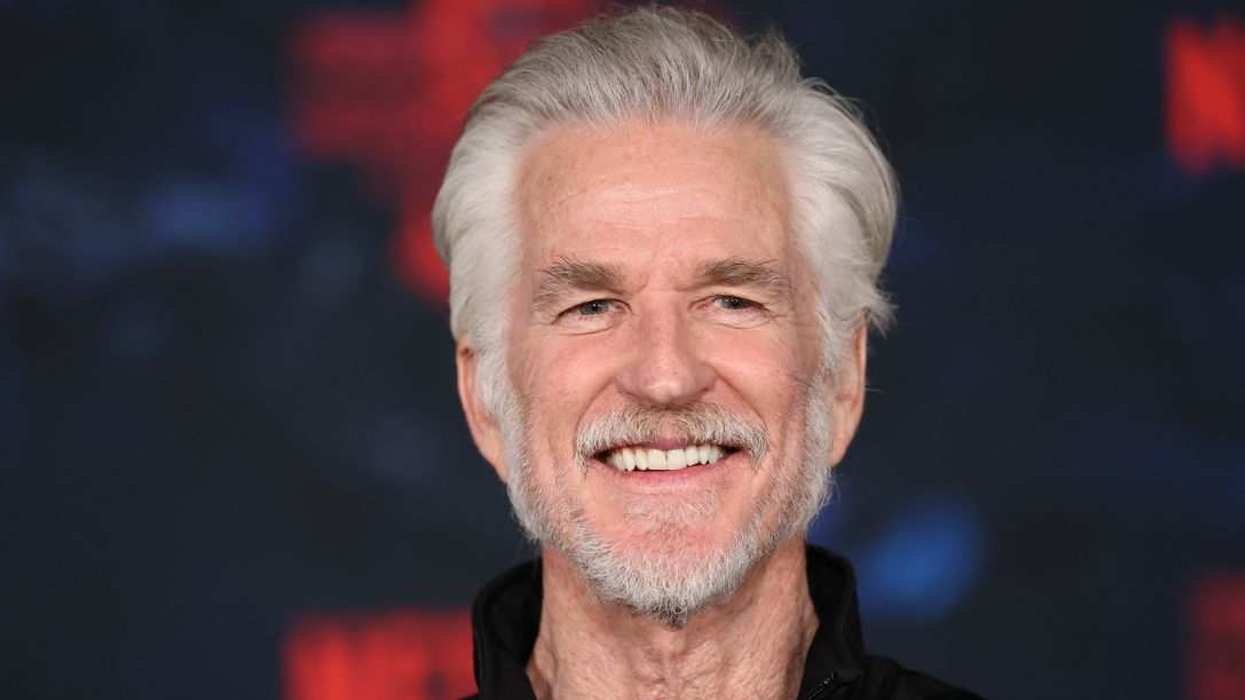Dexter Gurney-Paddick is speaking out about the impact cancer had on his mental health, and how he is excited to become a dad.
Gurney lost a lost a testicle to cancer at just 18 and thought he would never have kids because of the disease.
He was just a teenager when he was diagnosed with testicular cancer. Shortly after, he had his right testicle removed, going on to need grueling chemotherapy.
Now, he is cancer free and looking forward to marrying the love-of-his-life, Morgan Biggs. Who is expecting their baby in September.
Their planned wedding was postponed due to the pandemic, so they are hoping to tie the knot next year.
Gurney explained how the news have triggered his obsessive compulsive disorder (OCD), as well as post-traumatic stress disorder (PTSD).

Gurney opened up about being cancer-free but still struggling with his mental health.
“When I got the all clear in January 2018, that was the best feeling," he said.
“But it was from that point that my mental health deteriorated. I started to experience a lot of PTSD symptoms, like negative thoughts and reliving what I'd been through."
“I was feeling a mixture of constant worry and fear. If there was the smallest thing wrong with me, I'd think it was cancer and that I was going to die."

“I started to think the only thing I had going for me was that I'd beaten cancer," he continued.
“I knew I should be proud of that, but I felt I'd not achieved anything else in life. When I got into that pattern of thought it would spoil everything for me."
Biggs was a huge help.
“I think meeting Morgan at an Anytime Fitness gym and becoming a couple in February 2019 helped me realize that I had a future. She was very patient with me and we started planning to have a family," he said.
But it wasn't smooth sailing after that. He truly believed he would never be able to conceive a kid.
“The chemotherapy can have an impact on your fertility, so I feel very lucky that we were able to conceive and are expecting our first child in September," he said.
“Having the testicle removed did feel degrading. It definitely made me feel paranoid when it came to women, although they probably did not care."

“At first I was worried about being intimate with anyone. Being an 18-year-old with one testicle isn't the easiest thing to deal with, but it's a thing of the past now," he added.
“I do have my days when I look in the mirror and I can't cope with looking at my scars, but then on other days I look at them and think they are awesome and that I should be proud of them."

Before his diagnosis, Gurney experienced exhaustion.
“I did not go to the doctor because I was scared, but I'd done some research online and basically self-diagnosed testicular cancer even before I found the lump," Dexter recalled.
“I then found a hard, solidified lump about the size of a frozen pea in my right testicle, so then I knew, but it still took me three weeks to pluck up the courage to go the GP."
He was then diagnosed with a tumor at Churchill Hospital in Oxford. He was told it needed to be removed along with the testicle before it was sent for a biopsy to test the tissue and determine if it was cancerous.
“When I heard cancer, it was like in those adverts you see for cancer charities. Everything went hazy. I was fully aware of what the consultant was saying, but it was very surreal," he said.
“But they told me they would get me in for the operation in the next few weeks, so it felt like there was a plan in place. Although it was heartbreaking, I was very much like, 'Right, what's the next step? Let's get this done.'"

“I didn't want to make a big deal out of it and just wanted to carry on with my day until there was something to worry about," he said.
“But I told my tutors what was going on and asked them to tell people. It felt like I wanted the sympathy, because in my own way, it made me feel a bit stronger, like I could cope with it."
Five days after his ultrasound, Gurney had his right testicle removed and the biopsy confirmed it was cancerous. At the same time, a CT scan confirmed it had spread to the lymph nodes in his abdomen.

So, in January 2013, Gurney started chemotherapy.
“I was very arrogant towards chemotherapy. I was young, fit and healthy, I thought I was invincible. I thought I'd just feel a bit tired and lose my hair, but that was absolutely wrong," he said.
“At first, my symptoms were vomiting, but then I would get really bad hiccups that would reduce me to tears. I'd have them for hours non-stop and they'd really hurt my abdomen."
“I was put on steroids to help with the sickness, but they made me irritated, agitated and frustrated."
Then, more serious secondary effects took place.
“Six weeks in my hair started falling out and that was the first real moment for me. I thought I'd been doing alright until that point, but then I woke up and it was all on my pillow."
“That was heartbreaking for me. I text my friends and they came over and shaved my head for me. They did their own heads as well, so that eased it for me. It was an enjoyable moment in a dark time."

Continuing chemotherapy for the next three months had a profound effect on Gurney's mental health.
“During my last week of chemo I was having a bad day," he said.
“I told my family I wanted to go to the hospital on my own, which with hindsight was a mistake. I couldn't stop crying, I did not care about being alive. The thoughts that were going through my head were dark and drastic."
“I was too old to be on the children's ward, but was the youngest on the adult ward as well. It was strange for all the elderly people seeing me and how young I was. I used to sit with three elderly men and then one day one of them wasn't there anymore, which was really upsetting."

Advanced issue found
Thankfully, the chemotherapy was deemed a success.
“I felt invincible then, I started to live life like a typical teenager," he said.
“I did my final major project at college and still managed to get three As. I got a job in retail and started going out with my mates having fun."
But his mental health continued to be a concern.
“But about a year later I started to panic. I got really worried about the remaining bit of dormant cancer. As much as I was loving life it was always there in the back of my mind," he said.
So, in April 2014, Gurney had a six hour procedure to remove the rest of the tumor on his abdomen.
He had regular check-ups since then, and he was officially discharged in 2018.

However, the operation triggered his OCD.
“I would do weird things like if I didn't make my bed properly, I'd think I'd somehow get cancer. There was no logic behind it," he said.
“Everything I did had to be in even numbers, like if I didn't place two feet on the kerb when crossing the road, I'd think I'd get cancer and have to walk back to do it again."

“It really impacted my life. I did see a counsellor, but I struggled with admitting I had an issue," he said.
“Although I was never diagnosed, I also developed PTSD type symptoms at the same time. I was getting really bad nightmares and zoning out and having bad flashbacks."
“As soon as I started to get better physically, my mental health deteriorated."
Thankfully, he sought out help.
“I was put on anti-anxiety and anti-depressants to try and help," he said.
“Morgan is very caring and understanding when it comes to my mental health and always knows what to do and say when I am feeling low. She is beautiful and has a personality to match that!"

Joining his local Anytime Fitness gym also helped. He would exercise in the nights when he could not sleep.
“Going to the gym helped me feel good about myself. Normally, I go six times a week for an hour or two to lift weights," he said.
“I just put my music on and feel so much better. I think that's been the best thing for my mental health. I'm in my element there."
Now, as he looks forward to the next phase of his life with Biggs and their baby, he is keen to encourage other young men to see a doctor if they suspect there is anything wrong with their testicles.
“People hear cancer and put it together with death, but they shouldn't. Cancer, especially testicular cancer, does not have to be a death sentence," Gurney said.
“I was petrified, so I waited to go the doctor, but don't wait like I did. The worst thing about it for me was the chemotherapy, not having the testicle removed, so if I could have avoided that by going to the doctor earlier, I would have done."
“Life is so short. Every day I feel lucky that I'm still here. I've got a lot to look forward to and I'm excited for the future."








 Roberto Schmidt/AFP via Getty Images
Roberto Schmidt/AFP via Getty Images





 u/pizzaratsfriend/Reddit
u/pizzaratsfriend/Reddit u/Flat_Valuable650/Reddit
u/Flat_Valuable650/Reddit u/ReadyCauliflower8/Reddit
u/ReadyCauliflower8/Reddit u/RealBettyWhite69/Reddit
u/RealBettyWhite69/Reddit u/invisibleshadowalker/Reddit
u/invisibleshadowalker/Reddit u/Wishnik6502/Reddit
u/Wishnik6502/Reddit u/kateastrophic/Reddit
u/kateastrophic/Reddit u/blking/Reddit
u/blking/Reddit u/SlagQueen/Reddit
u/SlagQueen/Reddit u/geezeslice333/Reddit
u/geezeslice333/Reddit u/meertaoxo/Reddit
u/meertaoxo/Reddit u/crystal_clear24/Reddit
u/crystal_clear24/Reddit u/stinkpot_jamjar/Reddit
u/stinkpot_jamjar/Reddit
 u/Bulgingpants/Reddit
u/Bulgingpants/Reddit
 @hackedliving/TikTok
@hackedliving/TikTok @hackedliving/TikTok
@hackedliving/TikTok @hackedliving/TikTok
@hackedliving/TikTok @hackedliving/TikTok
@hackedliving/TikTok @hackedliving/TikTok
@hackedliving/TikTok @hackedliving/TikTok
@hackedliving/TikTok @hackedliving/TikTok
@hackedliving/TikTok @hackedliving/TikTok
@hackedliving/TikTok @hackedliving/TikTok
@hackedliving/TikTok @hackedliving/TikTok
@hackedliving/TikTok
 @vanderjames/Instagram
@vanderjames/Instagram @vanderjames/Instagram
@vanderjames/Instagram @vanderjames/Instagram
@vanderjames/Instagram @vanderjames/Instagram
@vanderjames/Instagram @vanderjames/Instagram
@vanderjames/Instagram @vanderjames/Instagram
@vanderjames/Instagram @vanderjames/Instagram
@vanderjames/Instagram @vanderjames/Instagram
@vanderjames/Instagram @vanderjames/Instagram
@vanderjames/Instagram @vanderjames/Instagram
@vanderjames/Instagram